Illusion of security: Why Budapest Memorandum failed to protect Ukraine from war
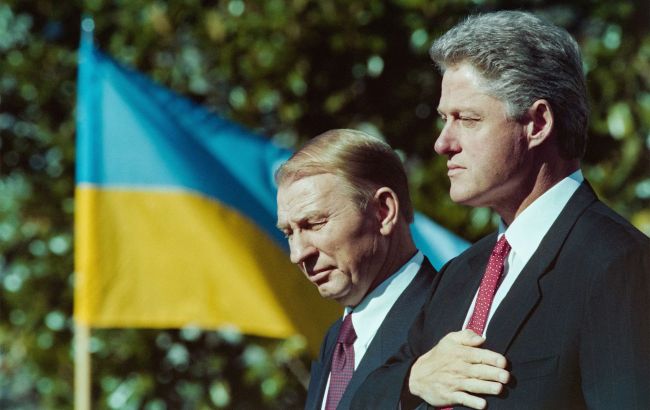 Ukraine's second president, Leonid Kuchma, signing the Budapest Memorandum under the guarantees of US President Bill Clinton and other leaders (photo by Getty Images)
Ukraine's second president, Leonid Kuchma, signing the Budapest Memorandum under the guarantees of US President Bill Clinton and other leaders (photo by Getty Images)
Today marks the 30th anniversary of the Budapest Memorandum, under which Ukraine gave up nuclear weapons in exchange for guarantees of territorial integrity from Russia, the United States, and the United Kingdom. However, in 2014, Russia occupied Crimea, unleashed a war in Donbas, and eight years later launched a full-scale invasion of Ukraine. Why the memorandum did not work and whether it is possible to restore Ukraine's nuclear status in this regard - read in RBC-Ukraine article.
Contents
- Who and how forced Ukraine to give up nuclear weapons
- Why Budapest Memorandum does not work
- Can Ukraine regain nuclear status
Who and how forced Ukraine to give up nuclear weapons
After the collapse of the USSR, Ukraine gained one of the most powerful armies and the third nuclear arsenal in the world. And this was of great concern to the collective West, led by the United States. In the early 1990s, the opinions of Washington and Moscow rarely coincided, but both wanted Ukraine to become a non-nuclear state.
Therefore, the young state was constantly pressured to get rid of warheads. As the first president of Ukraine, Leonid Kravchuk recalled, the United States threatened sanctions and total isolation.
“Both Clinton and Vice President Gore said that if Ukraine did otherwise, they would impose economic and other sanctions. How could Ukraine, having just been born, immediately become a threat to Europe and the world,” he said in an interview.
Therefore, on January 14, 1994, a joint statement was issued by Kravchuk, the leaders of the United States and Russia - Bill Clinton and Boris Yeltsin - on the removal of strategic nuclear weapons and Moscow's agreement in principle to some compensation.
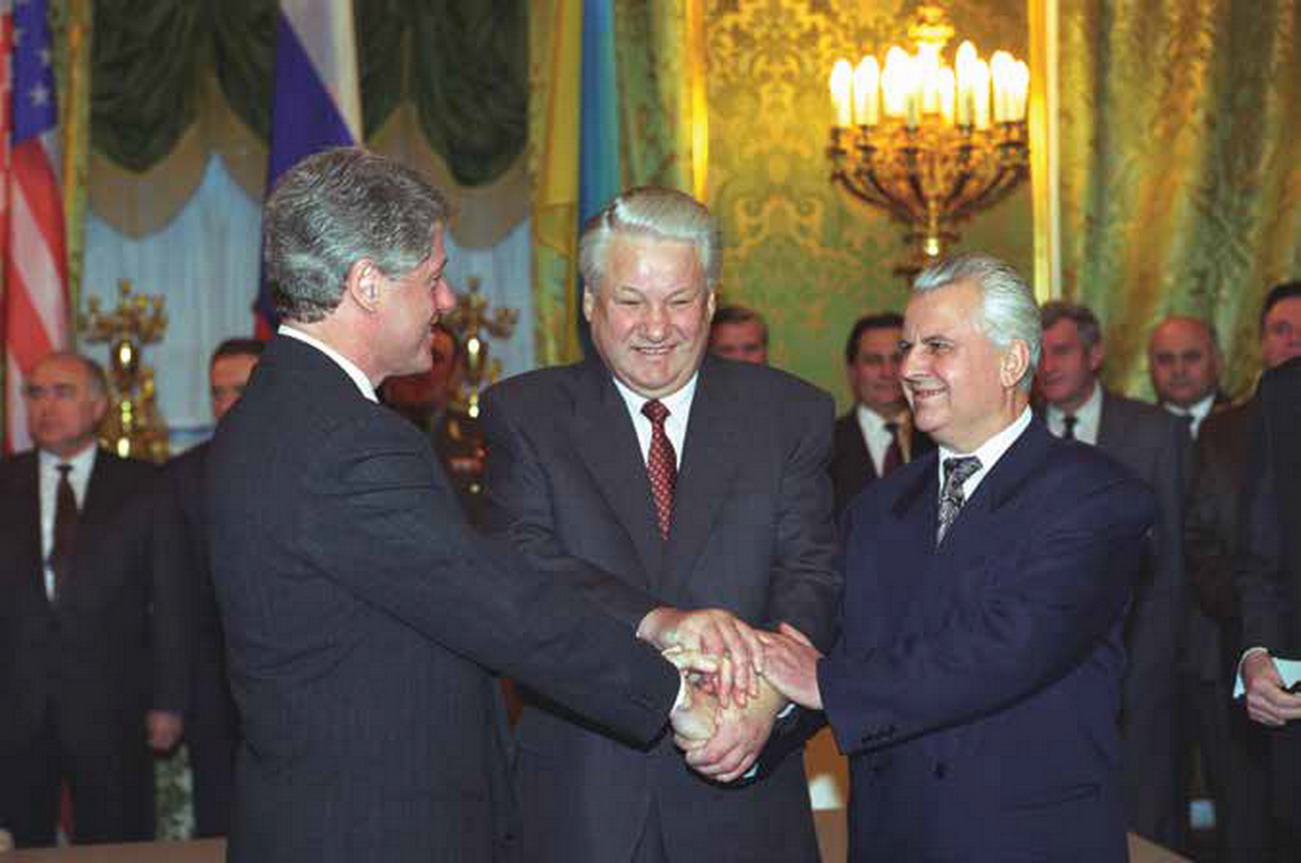 Bill Clinton, Boris Yeltsin, and Leonid Kravchuk after the joint statement in Moscow, 1994 (photo by clintonlibrary.gov)
Bill Clinton, Boris Yeltsin, and Leonid Kravchuk after the joint statement in Moscow, 1994 (photo by clintonlibrary.gov)
Less than a year later, on December 5, 1994, Ukraine's next president, Leonid Kuchma, signed a memorandum of security assurances in Budapest, Hungary, in connection with Ukraine's accession to the Treaty on the Non-Proliferation of Nuclear Weapons. Later, France and China joined the Budapest Memorandum.
According to the document, Ukraine gave up its nuclear arsenal, while the United States, Russia, and the United Kingdom pledged to respect Ukraine's independence and borders, to refrain from the use of force (or even threats of force), from economic pressure, and from anything that could violate its sovereignty.
The fact that the Budapest Memorandum does not contain any real security guarantees was mentioned by the second president of Ukraine, Leonid Kuchma, back in 2009.
“The then French President François Mitterrand said: “Son, don't believe this document, you will be deceived,” Kuchma said at an international conference in Jerusalem.
Ukraine fulfilled its obligations and on June 2, 1996, officially lost its nuclear weapons status. According to various estimates, Ukraine gave up 1,500 to 2,100 strategic and 2,800 to 4,800 tactical warheads.
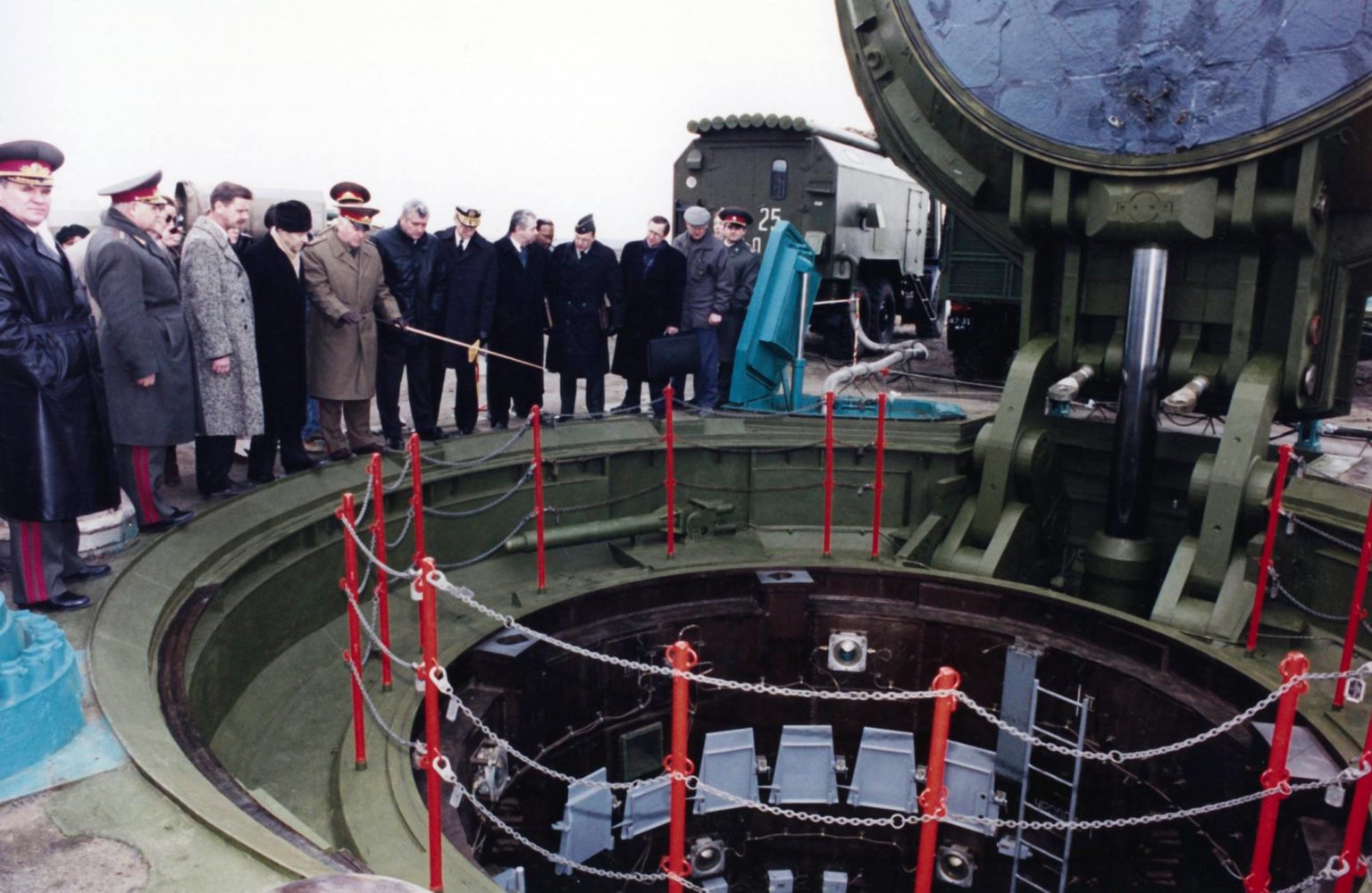 Ukrainian and American officials at the 43rd Missile Army silo, Pervomaisk, 1994 (photo by dtra.mil)
Ukrainian and American officials at the 43rd Missile Army silo, Pervomaisk, 1994 (photo by dtra.mil)
“In my opinion, this was one of the most remarkable stories of lies in the modern history of mankind. They signed a document with you that didn't exist. That is an illusion-signing something that did not work. And everyone who signed it understood that” Mykhailo Podolyak, advisor to the head of the Presidential Office, told RBC-Ukraine.
Yurii Kostenko, Minister of Environmental Protection and Nuclear Safety in the 1990s, believes that the correct question to ask is not “Could Ukraine have kept nuclear weapons?” but “Why did it not get anything in return?”
“Only when the last echelon with nuclear warheads left Ukraine in June 1996, we become uninteresting for the West. And what is there to take from Ukraine? The economy operates in the Russian coordinate system, and all proposals from the United States were rejected,” he said in an interview with RBC-Ukraine.
According to him, the United States offered another disarmament option: to process highly enriched uranium and plutonium into fuel for nuclear power plants. The American side was ready to finance this project. If this had happened, he estimated that the fuel would have been enough to this day.
Why Budapest Memorandum does not work
In the 1990s, it seemed that no one would attack Ukraine. Even Vladimir Putin, immediately after coming to power, repeatedly emphasized that he respected the borders of the neighboring state. “We don't want to take Crimea, it's absolute stupidity. If we start taking something away from someone, we will have something taken away from us,” he said.
Later, he reiterated that Crimea is not a disputed territory, and Russia has long recognized Ukraine's borders. “The question of any such goals for Russia, I think, smacks of provocation,” Putin added.
However, as soon as Ukraine tried to break out of the shadow of the so-called Big Brother, the rhetoric changed. The signatories of the Budapest Memorandum did not stand up for Ukraine either after the occupation of Crimea or after the outbreak of the war in Donbas.
Even during the full-scale Russian invasion of Ukraine, former US President Bill Clinton apologized for forcing Ukraine to give up nuclear weapons.
“I feel a personal stake because I got them (Ukraine) to agree to give up their nuclear weapons. And none of them believe that Russia would have pulled this stunt if Ukraine still had their weapons,” he admitted.
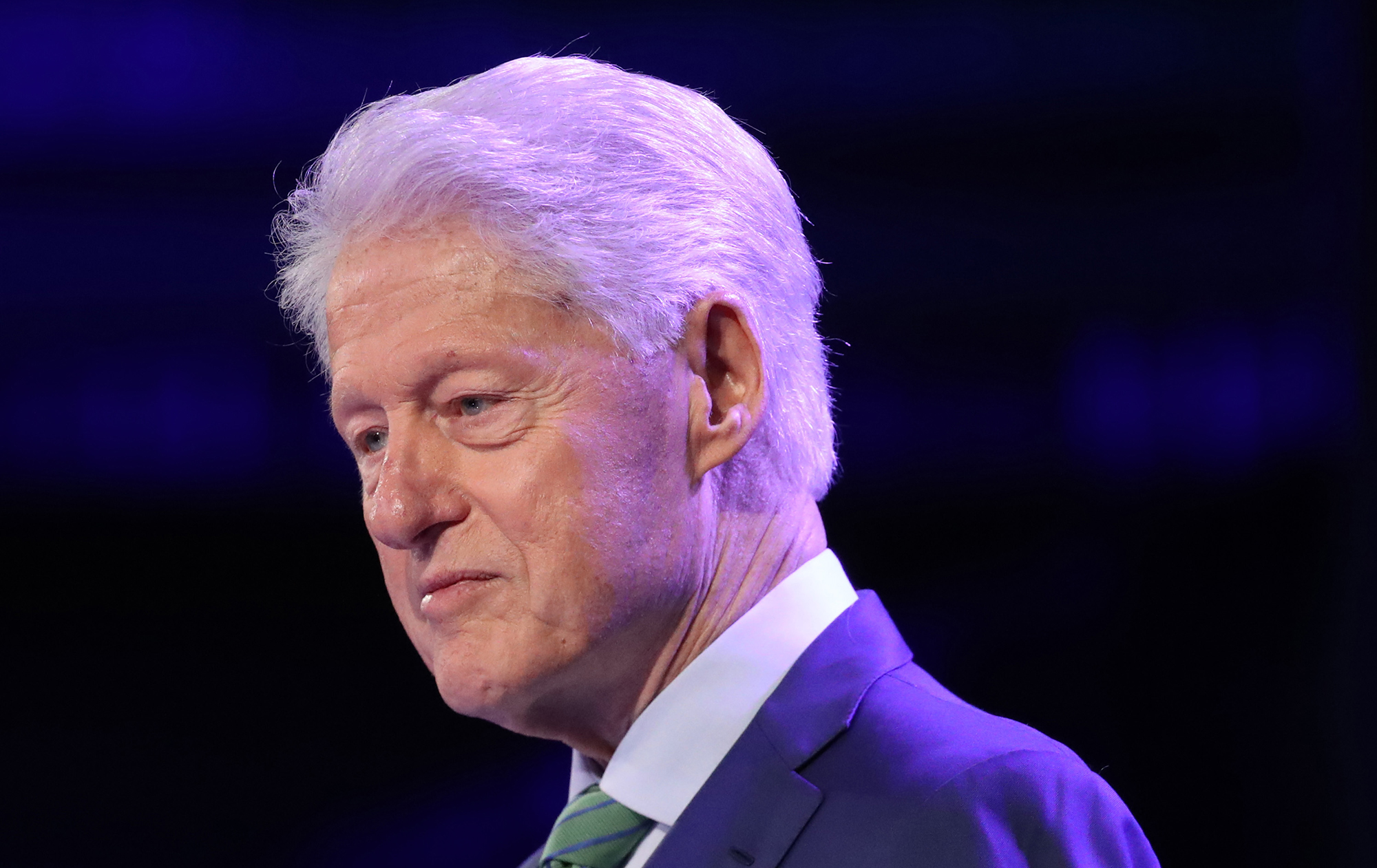 Bill Clinton admitted during Russia's full-scale invasion that he pressured Ukraine to give up its nuclear weapons (photo by GettyImages)
Bill Clinton admitted during Russia's full-scale invasion that he pressured Ukraine to give up its nuclear weapons (photo by GettyImages)
Western guarantors were unable or unwilling to fully protect Ukraine, allegedly because of differences in understanding the meaning and significance of the Budapest Memorandum. While the Ukrainian version of the Memorandum reads “Memorandum on Security Guaranties,” the English version reads “Memorandum on Security Assurances.” On the other hand, the signatures of the leaders of the United States and the United Kingdom appear under the Ukrainian and Russian copies, where the words “guarantees” and “guarantors” are written respectively.
The document was not subject to ratification in the parliaments but remained a full-fledged international treaty. But without any mechanism to guarantee security. In practice, the entire toolkit boiled down to consultations, in which Russia, for obvious reasons, did not intend to participate.
“It's not a question of nuclear weapons or strategic bombers, it's a question of who agreed on what, what were the tools for implementing the agreements. Not only are there no specific guarantees on what to do in a given situation, but one of the guarantors started the war,” Podolyak told RBC-Ukraine.
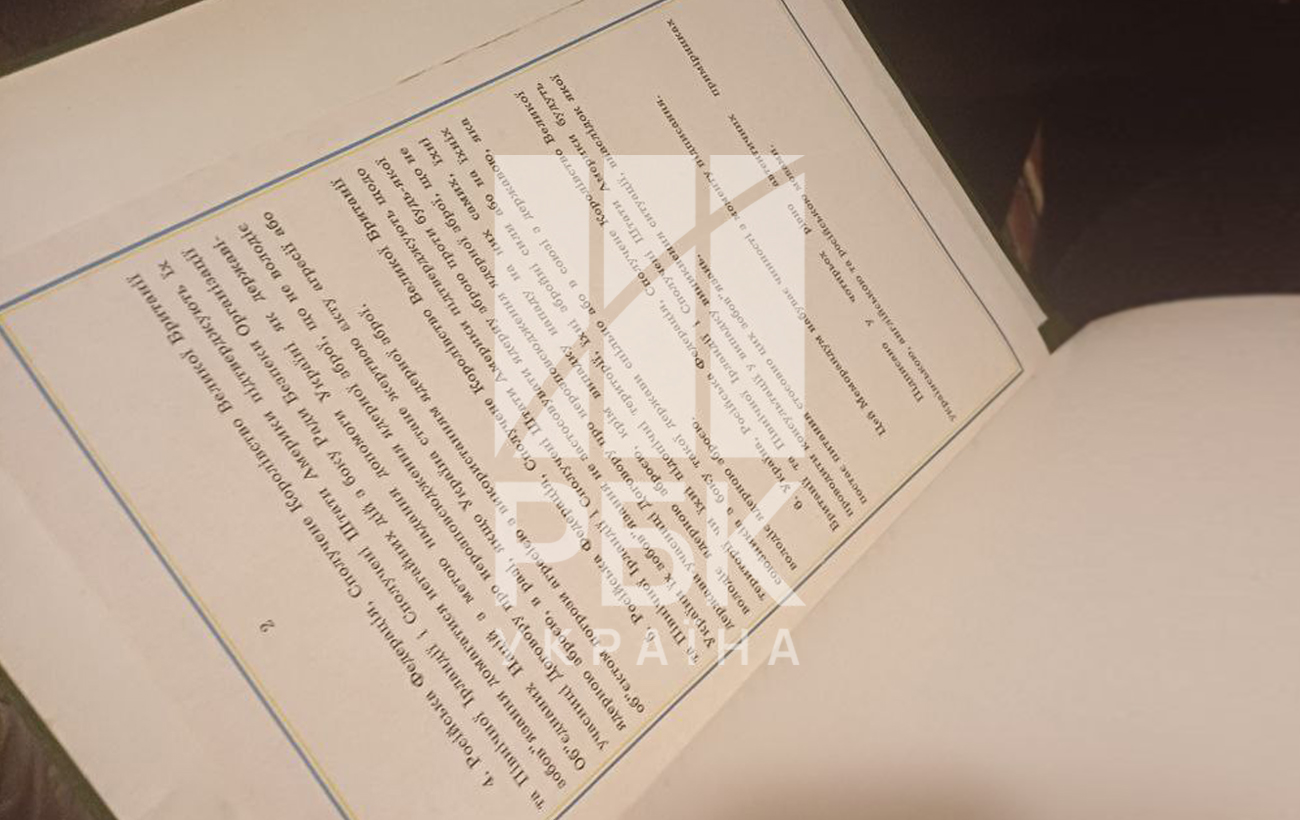 This is how one of the pages of the Budapest Memorandum looks like (photo by RBC-Ukraine)
This is how one of the pages of the Budapest Memorandum looks like (photo by RBC-Ukraine)
Back in 2016, Kravchuk was sure that Western powers were simply afraid to fight Russia.
“Russia is waging aggression against Ukraine. All these countries have to unite and stop Russia. Here I sit instead of Obama (then US President - ed.) and think: “World War III is inevitable”... In this case, the priority is no longer territories, no longer strengthening the sovereignty of one country, but strengthening humanity,” he said.
Can Ukraine regain nuclear status
It was logical that it was only a matter of time before the question of whether Ukraine should remain a non-nuclear weapon state if the other signatories had neglected the Budapest Memorandum.
A few days before the full-scale Russian invasion, at the Munich Security Conference, President of Ukraine Volodymyr Zelenskyy reminded the West of the security guarantees received for giving up the nuclear arsenal.
“We do not have those weapons, and we do not have security either. We also do not have part of the territories of our state... The Budapest Memorandum does not work, and all package solutions have been called into question,” he said.
In the fall of 2024, at a press conference in Brussels, he gave details of a conversation with Donald Trump, who was then a candidate for the US presidency. In particular, he said that the agreements between Ukraine's partners under the Budapest Memorandum and Russia were not working, but none of these nuclear powers had suffered.
“Who gave up nuclear weapons? All of them? No. One of them. Who? Ukraine. Who is at war today? Ukraine... And in a conversation with Donald Trump, I told him that we have a way out. Either Ukraine will have nuclear weapons, and then it will be our defense, or we must have some kind of alliance,” Zelenskyy said.
Later, he and his team members explained that joining NATO was a priority. After all, it is not difficult to imagine the consequences of an independent start of nuclear weapons, as Western partners could refuse to support Ukraine.
Mykhailo Podolyak explains that there are no means and resources to obtain weapons that would be large-scale and effective.
“And to get a dirty plutonium bomb that will not even solve tactical problems, but will destroy the reputation of Ukraine, which has renounced the obligations it assumed under the Budapest Memorandum, would be strange. That is, we would not solve any military issues, and at the same time we would discredit ourselves,” added the advisor to the head of the Presidential Office.
When the United States pressured Kyiv to get rid of its nuclear arsenal, Russia was seen as a more reliable partner in Western opinion, perhaps because of its alleged democratic credentials. However, as history has shown, in reality, Moscow has not abandoned its imperial ambitions and bellicose rhetoric. And 30 years later, it threatened nuclear strikes against decision-making centers not only in Ukraine.
For Ukraine, the story of the Budapest Memorandum should be a good lesson. Given the talks about what a future peace with Russia might look like, we need to achieve not only specific guarantees from specific guarantors but also an effective mechanism for their implementation. Otherwise, this peace will suffer the fate of the Budapest Memorandum too.

